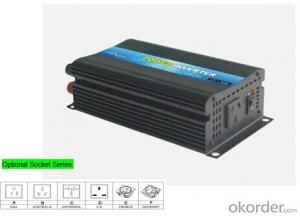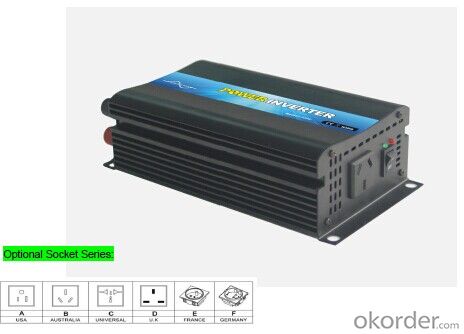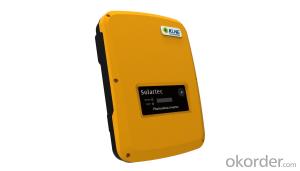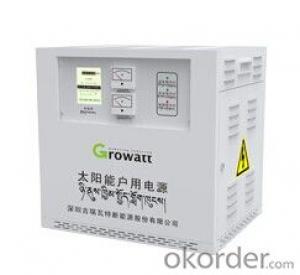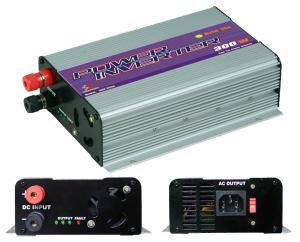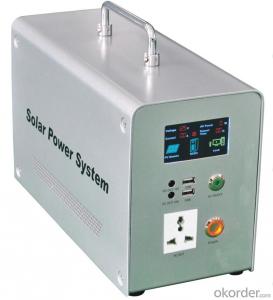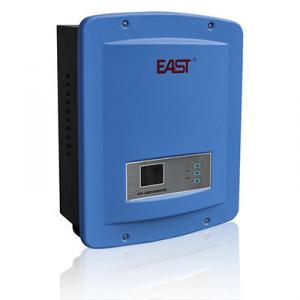300W Off-Grid Solar Inverter - Solar Inverter Italy
- Loading Port:
- China Main Port
- Payment Terms:
- TT OR LC
- Min Order Qty:
- -
- Supply Capability:
- -
OKorder Service Pledge
OKorder Financial Service
You Might Also Like
Features
Pure sine wave output (THD<3%)
Power ON-OFF switch
Input voltage range:-20% ~ +30%
Output voltage regulation:±10%
Thermo control cooling fan
Two-color indicators display power and fault status
Protections:short circuit, overload, over temperature,
Low battery voltage, over battery voltage, lack-voltage alarm.
Topology: Pull-push
Approvals: CE mark / EMC / LVD/ RoHS
1 year warranty (Remarks: Customizable input voltage such as 36v, 72v, 96v,110v;output voltage such as 120v, 130v, 200v,240v, etc; )
Order model No | P300w-12A | P3000w-24A | P300w-48A | P300w-12B | P3000w-24B | P300W-48B | ||||||
Output | AC voltage | 110V±10% | 220V±10% | |||||||||
Rated power | 300W | 300W | ||||||||||
Peak power | 600W | 600W | ||||||||||
Waveform (THD) | Pure sine wave (<3%) | Pure sine wave (<3%) | ||||||||||
Frequency | 60Hz ±0.3% or 50Hz ±0.3% | |||||||||||
Input | NO load current draw | <0.34A | <0.32A | <0.2A | <0.34A | <0.32A | <0.2A | |||||
DC voltage | 12V | 24V | 48V | 12V | 24V | 48V | ||||||
DC Voltage range | 9.5~16V | 19~32V | 38~63V | 9.5~16V | 19~32V | 38~63V | ||||||
Efficiency | > 86 % | > 88 % | > 90% | > 86 % | > 88 % | > 90 % | ||||||
DC connector | Cables With Clips or Car Adaptor | Cables With Clips or Car Adaptor | ||||||||||
Protection | DCLow voltage alarm | 10.3~10.6V | 20.6V ~21.2V | 41.2V~42.4V | 10.3~10.6V | 20.6V ~21.2V | 41.2V~42.4V | |||||
DC Low voltage shut down | 9.4~9.6V | 18.8~19.2V | 37.6~38.4V | 9.4~9.6V | 18.8~19.2V | 37.6~38.4V | ||||||
Over load | Shut Off Output | Shut Off Output | ||||||||||
DC Over voltage shut down | 15.8~16.2V | 30~32V | 60~63V | 15.8~16.2V | 30~32V | 60~63V | ||||||
Over thermal | Shut Off Output Automatically | Shut Off Output Automatically | ||||||||||
Fuses | Short Circuit | Short Circuit | ||||||||||
Environment | Working temperature | -10°c ~ +50°c | -10°c ~ +50°c | |||||||||
Working humidity | 10%~90%RH | 10%~90%RH | ||||||||||
Storage temperature | -20°c ~ +50°c | -20°c ~ +50°c | ||||||||||
Work altitude | ≤1000m | |||||||||||
Package | Machine Size(mm) | 220*118*63 | 220*118*63 | |||||||||
Packing Size(mm) | 250*120*66 | 250*120*66 | ||||||||||
Net Weight | 1.3kg/unit | 1.3kg/unit | ||||||||||
Gross Weight | 1.4kg/unit | 1.4kg/unit | ||||||||||
Packing Mode | Carton | Carton | ||||||||||
Other | Star | Soft Star | Soft Start | |||||||||
Cooling Ways | Cooling Fan | Cooling Fan | ||||||||||
- Q: Can a solar inverter be used with different monitoring platforms?
- Yes, a solar inverter can typically be used with different monitoring platforms. Most modern solar inverters are designed to be compatible with various monitoring platforms, allowing users to choose the one that suits their needs and preferences. This flexibility enables users to monitor and manage their solar energy production and consumption effectively, regardless of the specific monitoring platform they choose to use.
- Q: How does a solar inverter handle voltage and frequency variations caused by load shedding?
- A solar inverter is designed to handle voltage and frequency variations caused by load shedding by having built-in mechanisms and control systems. When load shedding occurs and the grid voltage or frequency deviates from the normal range, the solar inverter detects these variations and adjusts its operation accordingly. To handle voltage variations, the solar inverter employs a voltage regulation system. It continuously monitors the grid voltage and compares it with the standard voltage level. If the grid voltage decreases or increases beyond the acceptable range, the inverter adjusts its internal voltage conversion process to maintain a stable output voltage. This ensures that the connected solar panels continue to generate power within the acceptable voltage limits, minimizing any negative effects due to voltage fluctuations. Similarly, for frequency variations caused by load shedding, the solar inverter has a frequency regulation mechanism. It monitors the grid frequency and compares it with the standard frequency level. In cases of frequency deviations, the inverter adjusts its internal synchronization process to match the grid frequency. This allows the inverter to synchronize with the grid and feed the generated solar power in a manner that is compatible with the grid's frequency. In addition to voltage and frequency regulation, solar inverters often have additional functionalities to enhance their ability to handle variations caused by load shedding. These may include features such as anti-islanding protection, which ensures that the solar system disconnects from the grid during a power outage to prevent safety hazards to utility workers attempting to restore power. Furthermore, some advanced inverters can also have energy storage capabilities, allowing them to store excess solar energy and provide uninterrupted power supply during load shedding events. Overall, solar inverters are specifically designed to handle voltage and frequency variations caused by load shedding. Through their regulation and control systems, they ensure that the solar power generated from the panels remains stable and compatible with the grid, providing a reliable and efficient power supply even during challenging grid conditions.
- Q: How does a solar inverter handle variations in AC load demand?
- A solar inverter handles variations in AC load demand by continuously monitoring the load demand and adjusting the amount of power it delivers from the solar panels accordingly. This is achieved through advanced control algorithms that optimize the conversion of DC power generated from the solar panels into AC power that matches the load demand. The inverter maintains a stable voltage and frequency output, ensuring that the electrical devices connected to it receive a consistent and reliable power supply, even when there are fluctuations in the AC load demand.
- Q: Can a solar inverter be used with a monitoring system?
- Yes, a solar inverter can be used with a monitoring system. In fact, many solar inverters come with built-in monitoring capabilities or can be easily integrated with external monitoring systems. These monitoring systems allow users to track the performance of their solar panels, monitor energy production, and detect any potential issues or faults in real-time. This helps users optimize their solar energy generation and ensure the system is operating efficiently.
- Q: Can a solar inverter be used with a solar-powered electric vehicle charging infrastructure?
- Yes, a solar inverter can be used with a solar-powered electric vehicle charging infrastructure. The solar inverter converts the direct current (DC) produced by the solar panels into alternating current (AC) which is compatible with the electric vehicle charging system. This allows for the utilization of solar energy to power the charging infrastructure for electric vehicles.
- Q: Can a solar inverter be used with building-integrated photovoltaics (BIPV)?
- Yes, a solar inverter can be used with building-integrated photovoltaics (BIPV). The solar inverter is an essential component that converts the DC power generated by the BIPV system into AC power suitable for use in buildings. It ensures efficient utilization of the solar energy produced by the BIPV system and enables integration with the electrical grid or building's power system.
- Q: How do you calculate the maximum power point voltage for a solar inverter?
- To calculate the maximum power point voltage for a solar inverter, you need to determine the voltage at which the solar panels generate the maximum power output. This is done by varying the load resistance and measuring the corresponding power output. The maximum power point voltage is the voltage at which the power output is highest.
- Q: Can a solar inverter be used in areas with limited roof space or installation options?
- Indeed, areas with limited roof space or installation options can still make use of a solar inverter. Typically, solar inverters are compact, enabling installation in diverse locations like the ground, walls, or even indoors. Moreover, there are various types of solar inverters accessible, such as microinverters and power optimizers, which offer greater flexibility in system design and installation. By utilizing these alternatives, available space can be maximized, and more installation options can be provided for areas with restricted roof space.
- Q: Can a solar inverter be used in extreme weather conditions?
- Yes, solar inverters are designed to withstand extreme weather conditions. They are typically built with durable materials and undergo rigorous testing to ensure they can operate in extreme temperatures, high humidity, and even harsh weather conditions such as heavy rain or snow. However, it is always recommended to consult the manufacturer's guidelines and take necessary precautions to protect the inverter during extreme weather events.
- Q: Are there any safety considerations when installing a solar inverter?
- Yes, there are several safety considerations when installing a solar inverter. Firstly, it is important to ensure that the installation is done by a qualified professional who has the necessary knowledge and expertise. Additionally, proper grounding and electrical connections should be established to minimize the risk of electric shocks or fires. Adequate ventilation and protection from moisture should also be provided to prevent overheating and damage. Lastly, it is crucial to follow all manufacturer's instructions and local building codes to ensure a safe and compliant installation.
Send your message to us
300W Off-Grid Solar Inverter - Solar Inverter Italy
- Loading Port:
- China Main Port
- Payment Terms:
- TT OR LC
- Min Order Qty:
- -
- Supply Capability:
- -
OKorder Service Pledge
OKorder Financial Service
Similar products
Hot products
Hot Searches
Related keywords
